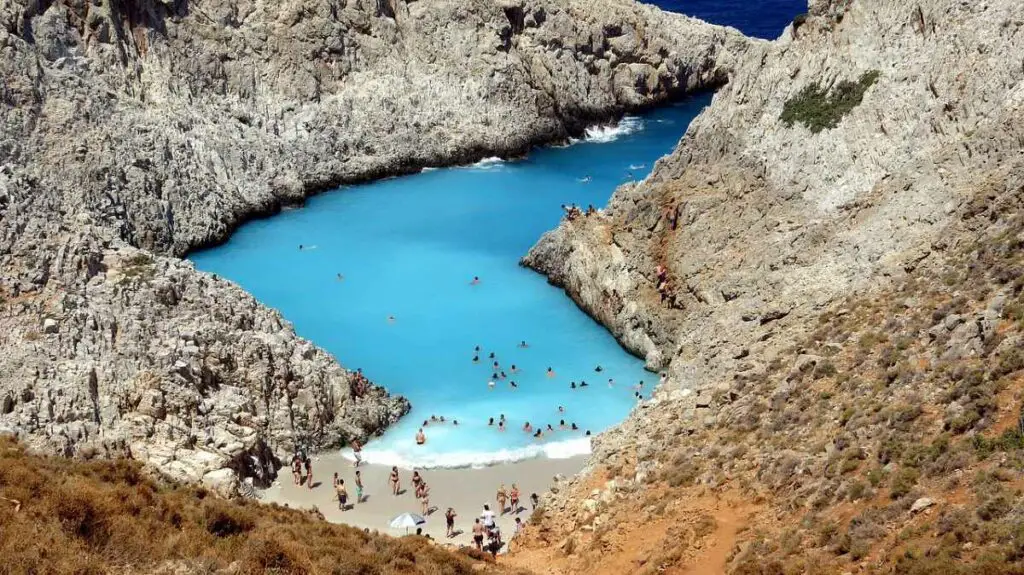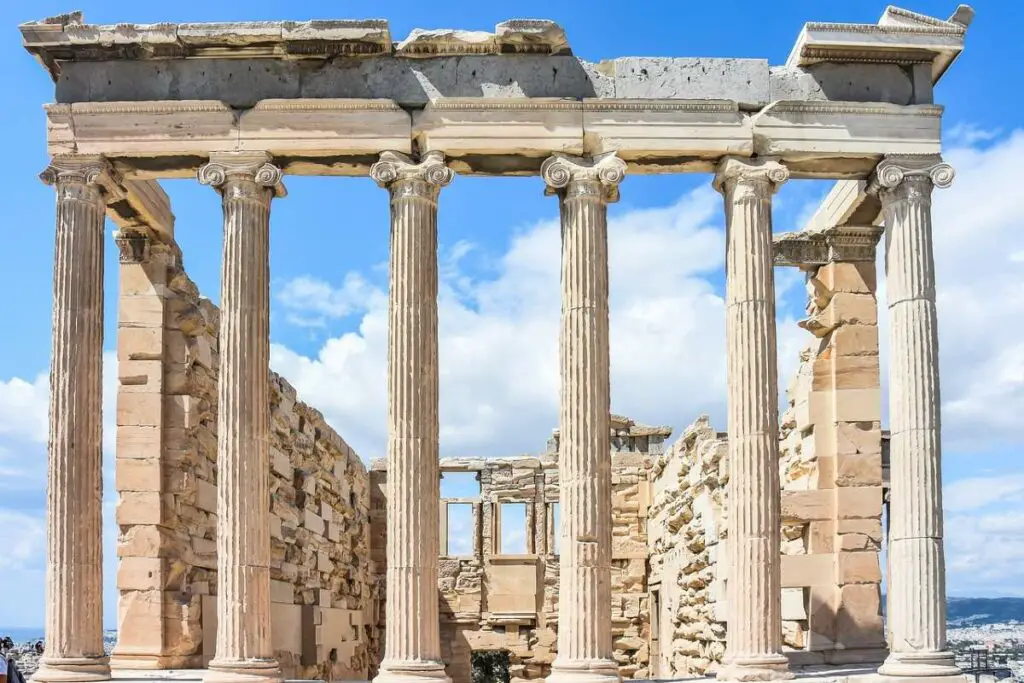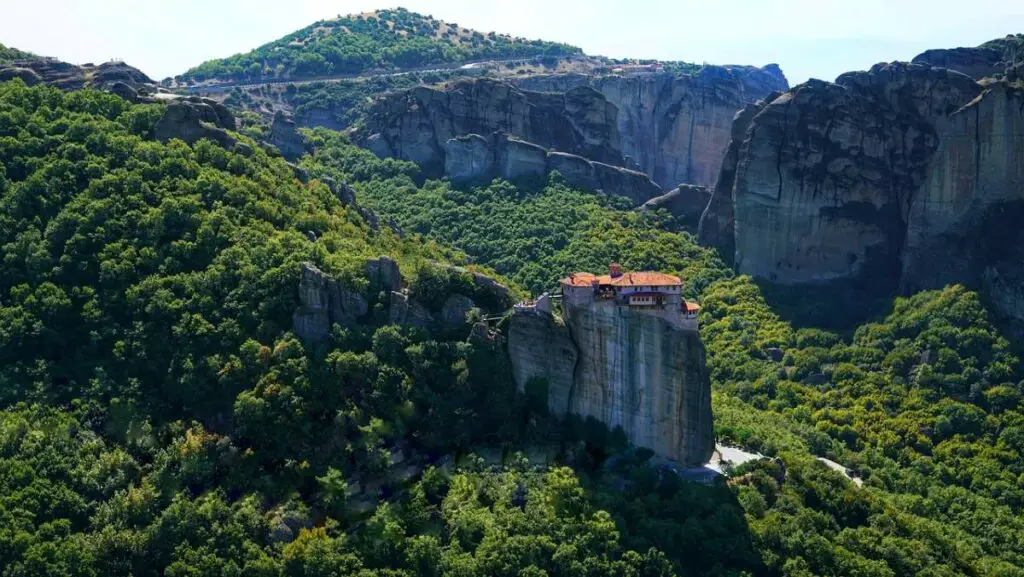Greece captivates travelers with its breathtaking landscapes, but staying alert to common travel scams is crucial. In this guide, we reveal the top scams to watch out for in Greece, must-see attractions, and essential travel tips to help you enjoy your trip safely.
Greece Scam While Traveling:
Here are the list of Greece Scam While Traveling:
The Picture Scam:
Don't take pictures for people you don't know, especially locals. Some might ask you to take their photo and then claim you broke their camera. Also, if photographers offer to take your picture, be cautious. They might ask for money afterward.

Phone Theft Trick Scam:
Some people in Greece trick others by asking for the time. When you check your phone, they grab it and run away. If a stranger asks for the time, don't take out your phone. Just say you don't know. Most people can check the time themselves. If someone asks you this, they might be trying to scam you.
Taxi Scam:
Be careful with some taxis. They might pretend to be luxury cars, mess with the meter to charge you extra, or they may say the meter is broken to make you pay more, even hundreds of dollars. They might take longer routes and say they're shortcuts. Also, watch out if they don't give you enough change, saying they don't have smaller bills.
So, ask the driver to turn on the meter and plan your route before getting in. Carry small bills and coins to avoid scams. Use licensed taxis or trusted ride-sharing apps, and always ask for a receipt.
Be careful of some taxis near airports or train stations. Stay away from unofficial taxi lines and only use the official ones. Make sure the meter is working to avoid paying too much.
Unofficial Tourist Police:
In this scam, someone pretends to be a tourist cop and offers to help you, but they might ask for money. Always ask for ID from anyone saying they're a tourist cop. If you're not sure, find and ask the real tourist cops or local police for help.
Fake Police Officers:
Watch out for scammers in police dress who say your ID is fake and want money. They may also steal your stuff while checking your ID and stuffs. So, if they approach, ask to show their ID, tell them you want to go to a real police station, or call your embassy.
Watch out for the Fake Trip Scam:
It's a common trick in Greece where local tour operators sell fake tickets to islands at lower prices. If you buy these tickets, you'll find out later that the trips don't exist! Exercise caution when approached by tour operators offering discounted tickets. Research their credibility, seek recommendations, and confirm trip details before making any payments. And the tour operator won't get back to you. If you encounter with this scam, report it to the authorities and notify your bank.
Friendship Bracelets and Rose Scam:
Be careful of strangers offering free gifts like friendship bracelets or flowers. They might ask for money later or try to steal from you while you're distracted. If you refuse, they might cause trouble. So, it's best to say no to unexpected gifts, keep away from street vendors, and be wary of strangers approaching you suddenly.
Pickpocketing and Bag Snatching:
In busy tourist places, watch out for pickpockets and bag snatchers. Sneaky people may try to take your wallet or valuables from your pockets or bags without you noticing. They might also try to distract you by dropping something or bumping into you.
To stay safe, be smart with how you secure your bags and stay alert in crowds. Also, avoid showing off expensive things and ignore distractions, as well as keep your valuables in different places. Travel with only what you need.
Accommodation/Hotel Scams:
Be cautious of false advertising when booking accommodations/hotels. Some places may appear charming in ads but disappoint in reality. To prevent this, thoroughly research and read reviews. Also beware of fake listings or upfront payment requests for non-existent properties or accommodations. Work with reputable agents and verify ownership documents.
Some accommodation providers may falsely claim to be affiliated with reputable hotels or resorts, offering discounted rates. However, they may provide subpar accommodations or disappear after payment. Book accommodations through trusted websites or directly with established hotels. Verify the legitimacy of any accommodation provider before making payments.
Some accommodation providers may attempt to charge additional fees for your stay, particularly when traveling in a group. They charge hidden fees that are not clearly disclosed during booking, increasing the overall cost of a stay. Clarify the pricing structure before making any payment to avoid unwelcome surprises.
Currency Exchange Scam:
Be careful when changing money. Some places may cheat you by giving bad rates, fake money, or tricking you. Use trusted places like banks or official exchange offices to exchange money. They are safe and fair.
Food and Drinks with Added Substances Scam:
Sometimes, tourists have faced situations where their food or drinks were spiked due to which they have faced theft and other problems. So, to stay safe, always be careful about what you eat and drink. Moreover, it's best to avoid anything given by unknown people.
Sim Card Scam:
Buying a local SIM card can be essential for staying connected, but some sellers may overcharge or provide SIM cards that don't work properly or have limited or no data. Thus, purchase your SIM card from official retail outlets or established mobile network shops.
ATM Scams:
Strangers may offer help at ATMs, intending to skim your card and steal your PIN. Be cautious while using ATMs. Scammers may place skimming devices to steal your card information. Decline assistance and use your hand to shield the number pad while entering your PIN. Also, opt for ATMs in well-lit, secure locations and avoid quiet area's ATMs.
Bar Friends Scam:
Enjoying the nightlife is great, but be cautious of scams at bars. Some people may invite you for a drink, then surprise you with a high bill. If you refuse to pay, you might find yourself escorted to an ATM by bar staff. So, pick a bar you know, check the prices, and avoid situations that seem too good to be true. Also, choose a bar you like or check the prices before ordering.
Credit Card Swap Scam:
Protect yourself from credit card scams at restaurants by keeping your card within sight. In restaurants or shops, dishonest employees may use portable card skimmers to clone your credit card information for fraudulent purposes. Thus, always check that the returned card is yours before leaving to ensure it hasn't been switched with an expired one.
Also be careful as the double charge card scam could occur. Some servers might charge your credit card twice for the same order. To protect yourself, consider paying in cash or, if using a card, accompany the server to the payment terminal to ensure a single and accurate transaction.
Beach Theft Scams:
Scammers target tourists by stealing unattended valuables on the beach when they are enjoying. To stay safe, don't bring valuable items to the beach. If needed, use lockers or ask someone reliable to watch over your belongings. Always keep an eye on your things to prevent theft.
In popular beach destinations tourists often rent motorbikes or engage in water sports. However, scams can occur, especially with hidden damages. Some vendors cover existing damage with tape and, upon return, blame tourists for the pre-existing issues, presenting a hefty repair bill. To avoid such scams, consider organizing water activities through your hotel for direct complaint options. When renting a motorbike, carefully inspect it for hidden damages as well as take extensive photos.

Top Things to see in Greece
Now you know about the Greece Scam While Traveling. But, that doesn’t mean you should avoid to visit Greece. Keeping in mind about the possible tourism scams as mentioned earlier, you can enjoy your travel exploring these Top Things to see in Greece:
- Fira.
- Chania Town.
- Mýkonos City.
- Heraklio Town.
- Oia.
- Rhodes Town.
- Corfu Town.
- Kamari.
- Imerovigli.
- Meteora.
- Delphi.
- Dion Archaeological Park.
- Museum of the Royal Tombs of Aigai.
- Temple of Poseidon.
- Mycenae and Epidaurus.
- Rethymno Town.
- Naxos Chora.
- Firostefani.
- Acropolis of Athens and Agora.
- Orthodox Metropolitan Cathedral.
- Church of Kapnikaréa.
- The Church of the Panagia.
- Lake Pamvotis.
- Knossos Archaeological Site.
- National Museum of Contemporary Art.
- Mount Athos And Ammouliani's island.
- The Athens Centre.
- Cine Paris, Lalaria Beach.
- Voidokilia Beach.
- Kalamaki Beach.
- Tsambika Beach.
- Porto Timoni Beach.
- Elafonissi Beach.
- Seitan Limania Beach.
- Plaka Beach.
- Avithos Beach.
- Simos Beach.
- Melissani Cave.
- Vlacherna Monastery.
- Cameo Island.
- Assos, and so on

Traveling Greece Tips:
Here are few more Traveling Greece Tips to avoid possible travel scams in Greece.
1. Get a Local SIM Card:
Start your trip by getting a local SIM card. It'll help you use your phone for maps, checking info, and calling for help if you need it. Make sure to download useful apps like maps, ride-sharing, and translation tools before you go.
2. Plan Ahead:
Before you go on your trip, find out about places to visit, how to get around, local rules, and things to watch out for. Make a plan with maps, directions, and contacts for where you're staying and who to call if you need help. Having a good plan helps you avoid scams.
3. Verify Info:
Don't trust info from people you don't know, especially if they approach you first. Instead, use guides, official sources, or ask your embassy for accurate details about places, events, and local stuff.
4. Learn the Local Rules:
Know the rules of the place you're visiting so you understand what you can and can't do. This helps you avoid getting tricked by scammers who might try to use your lack of knowledge against you.
5. Learn Basic Local Language:
Knowing a few easy local words can keep you safe from common travel scams. For example: Saying "hello" and "thank you" in local language can help you connect with locals and signal that you're not an easy target for scams.
6. Stay Confident:
Scammers look for tourists who seem unsure. Act confident, even if you're not sure where you are. Also, say "no thanks" firmly to offers or invitations from strangers you don't trust.
7. Use Trusted Transportation Apps:
When you need a ride, go for popular ride-sharing apps. Because, they show you how much your trip will cost and tell you about your driver.
8. Keep Valuables Secure:
Get a special bag or pouch that's hard for thieves to steal from. Also, keep important things like your passport and travel insurance in a safe place.
9. Blend In with the Locals:
Wear simple clothes, following the local customs and avoid showing off valuables. This helps you blend in with locals and not attract unwanted attention. But still, be careful who you trust, as not everyone is friendly.
10. Be Sure Before Drinking or Smoking:
Before drinking or smoking in public places, make sure it's allowed. Because, some places may have strict rules, and breaking them could get you in trouble. Also, avoid buying from street sellers, as their products might be low quality and cause problems. If unsure, ask locals or other travelers for advice.
11. Secure Your Place to Stay:
When booking a hotel, use trusted websites or the hotel's official site. Check your booking info carefully and keep a copy of your reservation. This helps avoid any issues when you get there.
12. Avoid Promotional Illusions:
Be careful on social media. Some offers for free stuff might ask you to share or comment to enter. But watch out! Some of these are tricks to get more likes and followers. Always double-check these offers and make sure they're genuine before you join in.
13. Maintain a Low Profile:
While traveling, avoid drawing attention to yourself. Use simple bags and only carry what you really need. Keeping a low profile can help you avoid getting noticed by scammers.
14. Use Trusted Services:
When booking tours, transportation, or services, opt for well-established and reviewed providers. Read online reviews, consult guidebooks, and ask fellow travelers for recommendations.
15. Use Trusted Currency Exchange:
Only exchange your money at banks or official currency exchange places. Avoid using ATMs that aren't from major banks. Because, they might charge you high fees, or they be the fake or skimming ones.
16. Be Wary of Tempting Offers:
Don't easily trust things like super cheap prices, attractive women, friendly strangers, or too-good-to-be-true deals. Take a moment to think before saying yes, as these could be scams to trick you. Always double-check if something seems fishy before agreeing to it.
17. Check the Source:
When you see a cool deal online, make sure it's from a genuine place. So, look for contact info and see if they seem real. Genuine places give clear details. If it seems too amazing, then search for more info to make sure it's not a trick.
18. Share Your Itinerary:
Make sure a close friend or family member knows your travel plans. That way, someone knows where you are in case you need help.
19. Negotiate Wisely:
Negotiate prices respectfully while shopping at local markets and shops. If you feel pressured, don't hesitate to walk away.
20. Stay Updated:
To avoid troubles, it's good to learn about local scams and hear from other travelers. Ask for tips and suggestions from people who have been there before.
21. Trust Your Instincts:
If something feels suspicious, then trust your instincts and consider other options.
22. Report Suspected Scams:
If you think something fishy is going on or you're not sure, then tell the local police or your embassy. This helps keep others safe and stops the scammers.

FAQs On Greece Scam While Traveling And Top Things to see in Greece as well as Traveling Greece Tips
How can I distinguish between official and unofficial tour guides to avoid Greece Scam While Traveling?
Choose guides recommended by tourist offices or well-known companies. Likewise, avoid taking tours from random people you meet on the street. Also, it's safer to book your tours ahead of time through trusted sources.
How can I identify genuine tour guides at Top Things to see in Greece to avoid Greece Scam While Traveling?
Genuine tour guides often work for well-known companies. So, don't accept offers from strangers near tourist spots. Instead, book tours in advance with trusted sources and check if your guide is qualified.
Are street sellers near Top Things to see in Greece reliable for purchasing souvenirs?
Watch out for street sellers who might sell fake or expensive souvenirs. Also, go to known stores for souvenirs, check prices in advance, and be careful with offers that seem too good to be real to stay safe from scams.
What precautions should I take when using public transportation to visit Top Things to see in Greece?
Be careful in busy transportation areas, use anti-theft items, and keep your valuables safe. Also, watch out for distractions and be cautious if someone you didn't ask for help offers assistance, especially in crowded tourist places.
How can I protect myself from Greece Scam While Traveling to explore Top Things to see in Greece?
Follow the Traveling Greece Tips i.e. before visiting popular attractions, research them in advance. Purchase tickets through official services and be wary of unauthorized sellers offering discounts. Meanwhile, rely on reputable information centers or trusted online platforms for accurate information.
What are some Traveling Greece Tips to avoid Greece Scam While Traveling while exploring Top Things to see in Greece?
Stay informed about common scams, be cautious of unsolicited offers, and rely on official channels for information and bookings. Likewise, use secure accessories for valuables, trust accredited guides, and report any suspicious activities to local authorities.

Conclusion About Greece Scam While Traveling And Top Things to see in Greece As Well As Traveling Greece Tips
Now you know about the Greece Scam While Traveling And Top Things to see in Greece as well as Traveling Greece Tips. So, if you want to say anything related to this post, then please feel free to place your comments below.
Share Your Experiences On Greece Scam While Traveling And Top Things to see in Greece and Traveling Greece Tips:
If you've come across more "Greece Scam While Traveling" or have fascinating travel stories to share "Traveling Greece Tips", we'd love to hear from you. Feel free to leave a comment below, as your input can help others learn from your valuable experiences and insights.
Spread Awareness On Greece Scam While Traveling And Top Things to see in Greece and Traveling Greece Tips:
Please feel free to share this information with your friends and families through your social media accounts to let them know about the possible scams they can encounter while traveling in Greece.
Join the Conversation
If you possess any valuable information about tourism scams, regardless of their location in the world, please don't hesitate to get in touch with us via email at ad***@********ws.com. Your input can truly make a significant difference in ensuring the safety of travelers globally.
Additional Info On Greece Scam While Traveling And Top Things to see in Greece and Traveling Greece Tips:
Below you can find additional info such as references and other related articles:
References
Other Related Articles:
Travel wisely and savor all the delights that the Greece has in store for you!


Leave a Reply